This, alas, is not going to be one of those highly informative posts by a knowledgeable person possessing vast information on the subject. Instead, it’s a partial response to several different topics that have crossed my consciousness lately. One is an ongoing issue–the role of the Other (exotic, evil, dangerous, wild, etc.) in our culture and our storytelling, and what it is like living in a country of one of our current primary Others (Arabs) for the last year. Another is an article I read recently on the current state of Arab cinema (burdened by censorship, unwieldy bureaucracy, and funding problems–see also here and here). Finally there was a conversation last night on the future of the Arab world in which the subject turned to education. As in the US, discussions about the role of education tend to focus on job readiness and the economy, but it’s art and storytelling that are crucial for cultural health, and growth.
“Arab Fantasy” could mean fantasy by outsiders using elements of Arab tradition, or fantasy by Arabs using traditional or other source materials. The best-known source in the west is, of course, One Thousand and One Nights in its numerous versions, although (quoting from wikipedia, that utterly reliable source), “Some of the best-known stories of The Nights, particularly “Aladdin’s Wonderful Lamp”, “Ali Baba and the Forty Thieves” and “The Seven Voyages of Sinbad the Sailor”, while most likely genuine Arabic folk tales, were not part of the The Nights in its Arabic versions, but were interpolated into the collection by its early European translators.” Actually the article is a pretty interesting overview, and I learned a bunch of stuff. Genre works influenced by Nights are many; titles I’ve read recently enough that they float to the surface include Tim Powers’ World War II espionage-with-djinns novel Declare, Diana Wynne-Jones’ Aladdin sendup, Castle in the Air, and P.B. Kerr’s Children of the Lamp series, aimed primarily at middle-grade readers, but entertaining enough for undemanding adults, and, it seems, forthcoming as a movie from Dreamworks. …
Read More Read More
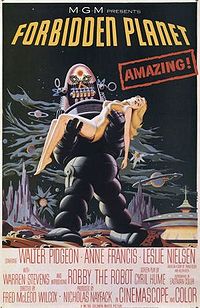 Given all the discussion of late about reboots, I wonder why no one has ever thought to revisit this classic. Forbidden Planet was my Star Wars when I was in fifth grade. In the New York metro area, Channel 9 had a feature called “Million Dollar Movie” that used to play a particular movie ever day throughout the week in the early evening. Forbidden Planet was a regular staple, and whenever it was in rotation, I was there in front of the TV (which, to give you an idea of how old I am, displayed only black and white).
Given all the discussion of late about reboots, I wonder why no one has ever thought to revisit this classic. Forbidden Planet was my Star Wars when I was in fifth grade. In the New York metro area, Channel 9 had a feature called “Million Dollar Movie” that used to play a particular movie ever day throughout the week in the early evening. Forbidden Planet was a regular staple, and whenever it was in rotation, I was there in front of the TV (which, to give you an idea of how old I am, displayed only black and white).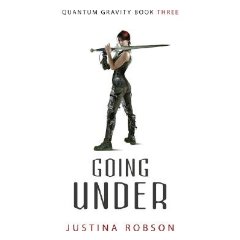 The notion of the female warrior, while rooted somewhat in factual history (e.g., Joan of Arc), is largely an idealized notion of mythology, science fiction and fantasy. I suppose there is doctoral dissertation potential in figuring out why patriarchal societies that at best otherwise relegate women to supportive roles away from the battlefield (and at worst and more typically brutally victimize women as spoils of war) generate these tales of powerful females who can lop off a head or two as well as the next guy. Speaking as a guy whose adolescent sexual fantasies were heavily influenced by Emma Peel, the black leather-clad consort of John Steed in saving the free world from various madmen bent on world domination by delivering a quick blow to the groin, I’m guessing it’s some kind of inversion of castration anxiety.
The notion of the female warrior, while rooted somewhat in factual history (e.g., Joan of Arc), is largely an idealized notion of mythology, science fiction and fantasy. I suppose there is doctoral dissertation potential in figuring out why patriarchal societies that at best otherwise relegate women to supportive roles away from the battlefield (and at worst and more typically brutally victimize women as spoils of war) generate these tales of powerful females who can lop off a head or two as well as the next guy. Speaking as a guy whose adolescent sexual fantasies were heavily influenced by Emma Peel, the black leather-clad consort of John Steed in saving the free world from various madmen bent on world domination by delivering a quick blow to the groin, I’m guessing it’s some kind of inversion of castration anxiety.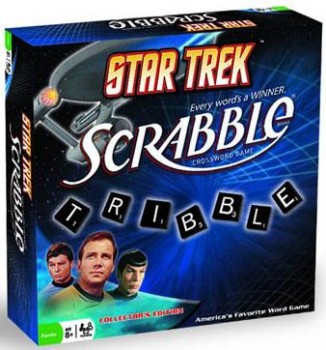 Recently I had occasion to visit the toy store — a rarity in a life spent avoiding children as much as possible — and was sort of blown away by how different it was than I remembered. The last time I was in a toy store was probably as a pre-teen buying Advanced Dungeons & Dragons books (yes, unbelievable as it seems, Fiend Folio and Unearthed Arcana used to share self space with Teddy Ruckspin and Cabbage Patch Kids at the local Toys ‘R Us) and, while I wasn’t surprised to see a complete lack of anything RPG in my visit, what did impress me is just how much fantasy and scifi oriented material I did find — you might even say the place was a juvenile spec fic warehouse, though with a side order of dinosaurs, pirates, and the occasional pony.
Recently I had occasion to visit the toy store — a rarity in a life spent avoiding children as much as possible — and was sort of blown away by how different it was than I remembered. The last time I was in a toy store was probably as a pre-teen buying Advanced Dungeons & Dragons books (yes, unbelievable as it seems, Fiend Folio and Unearthed Arcana used to share self space with Teddy Ruckspin and Cabbage Patch Kids at the local Toys ‘R Us) and, while I wasn’t surprised to see a complete lack of anything RPG in my visit, what did impress me is just how much fantasy and scifi oriented material I did find — you might even say the place was a juvenile spec fic warehouse, though with a side order of dinosaurs, pirates, and the occasional pony.

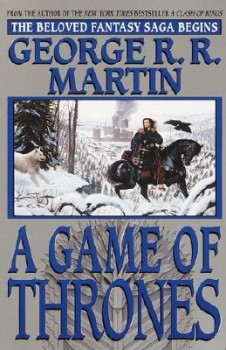 Reading James’ post on Wednesday about the fan angst surrounding George R. R. Martin’s A Song of Ice and Fire series (and some of the unnecessarily blunt backlash), I started thinking about just how much I know about this hugely popular saga which I have actually never read. Indeed, having not even read it, I can say I am predisposed to already like it but, as Dave commented on James post, I’m also one of those people who tends not to buy into series with no end in sight.
Reading James’ post on Wednesday about the fan angst surrounding George R. R. Martin’s A Song of Ice and Fire series (and some of the unnecessarily blunt backlash), I started thinking about just how much I know about this hugely popular saga which I have actually never read. Indeed, having not even read it, I can say I am predisposed to already like it but, as Dave commented on James post, I’m also one of those people who tends not to buy into series with no end in sight.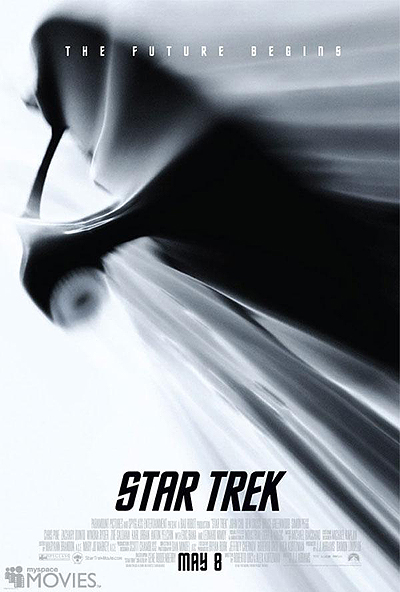 Star Trek (2009)
Star Trek (2009)